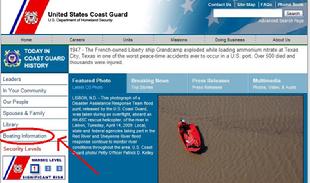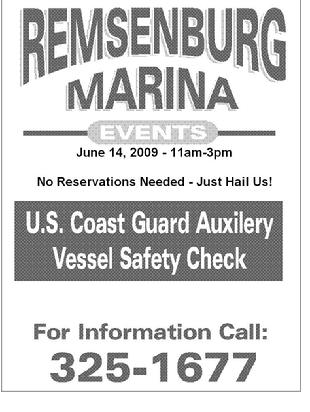|
Vincent Pica
Chief of Staff, First District, Southern Region (D1SR)
United States Coast Guard Auxiliary
|
|
A Public-Private Partnership – Safety of Life at Sea and Boat Dealers
There is a lot of talk these days out of Washington regarding “public-private” partnerships in solving the economic difficulties our economy is in. And it makes a lot of sense for government and business to work together to maximize the effect of programs and policies. There is another public-private partnership that works well together but can be even more effective if boat dealers thought more about it – US Coast Guard Forces and boat dealers working together to raise boating skills and seamanship levels at the point of purchase. This column is about that.
All It Takes To Buy a Boat Is Money…
In many states, including New York, there are no state licensing requirements for boat drivers. The old saying goes, “Any idiot can buy a boat and some do!” and it often rings true when you read about some of these horrific accidents at sea – usually encompassing boating and alcohol. What’s a body to do? Well, how about getting your body into a USCG boating safety class?
Point of Purchase = Point of Maximum Impact
There would be little argument that the best place to instill a deep need for boating skills and seamanship abilities, other than at the dinner table while growing up, is right at the point of purchase. Now some boat dealers might think that bringing up such a subject as boating skills and seamanship will scare off a buyer or cause the buyer to buy a smaller, more manageable boat instead of the battle-wagon being eyed… There may be some argument to that but most boat dealers know that showing such concern for the safety of the client creates a client for life. And that means follow-on sales and deep, satisfying relationship. Less “altruistically”, a guy who wrecks his expensive boat, or worse, is more likely to sell the boat and never come back.
|
So what should the dealer be recommending? Two things – skipper education and vessel safety checks annually. All you need to remember is one web site – www.uscg.mil – and click on boating information! This link will lead you to boating safety classes in the owner’s locale as well as the ability to schedule a vessel safety check online. It can’t be much easier!
If the skipper is knowledgeable and the boat meets USCG standards, that is a great mix.
|
 |
| click here to enlarge the image |
|
|
 |
| click here to expand the image |
|
| But There Is a Bigger Idea!
There is a much bigger idea than just referring the customer to the internet. What about classes at the show room? Some boat dealers also have marinas. In our division (USCG Auxiliary Division 18 covers the eastern half of Long Island, NY, encompassing 3 USCG stations and tens of thousands of boaters), we have run boating safety classes in many dealer show rooms or their conference rooms and all the boat owners walk out waving at the dealer saying “thanks so much for arranging this!” And the boaters pay a fee for the class which goes towards further boating safety activities. Out of pocket for the dealer – coffee and cookies?
Another big idea – how about scheduling a vessel exam day at the marina? The downside is that you run out of flares (the #1 reason for a boat failing to be awarded a Vessel Safety Check windshield emblem is expired flares – so if you are going to run a vessel exam day, store up extra flares ahead of time! See SSP, “No Fuss, No Muss – and your Favorite Price – Free! The Vessel Safety Check!”, April 2008 [http://www.atlanticmaritimeacademy.com/vsc.html ])
|
What will the Vessel Examiner look for? click here!
And remind your clients that this is NOT a regulatory event. If the boat doesn’t meet a requirement(s), the examiner is very likely going to say, “Here is what you need to address. Here is my cell phone #. When you are ready for me to come back, call me!” And it ends there. No one “turns you in”…
Discussion Items
The Vessel Examiner will also conduct a discussion with the skipper and the crew about the following safety items which are not required by regulation but still considered highly desirable by the USCG:
1. If a life raft is on board be certain it has a current inspection on the raft and hydrostatic release mechanism.
2. If an EPIRB is on board, be certain it is registered to the boat and that the registration is current. If it is hydrostatically deployed be certain the hydrostatic release mechanism is in date. Be certain the battery is in date and working.
3. If survival suits are on board, unpack them and be certain there are no tears or dry rot. Be certain working lights and a whistle are attached. Be certain the zipper is operable (if it needs waxing, wax it!). Be certain the vessel name is stenciled on the back of them as well as on your life jackets.
4. How about a VHS radio? Cell phones are nice but unlikely to save your life! See SSP, “Sounding Smart on the Radio”, 8/1/2007, http://www.atlanticmaritimeacademy.com/radio.html and SSP, “Can You Hear Me Now – Boats and Cell Phone”, 1/7/09, http://www.atlanticmaritimeacademy.com/cellphones.html
5. Where’s your anchor?
|
BTW, if you are interested in being part of USCG Forces, email me at JoinUSCGAux@aol.com or go direct to the D1SR Human Resources department, who are in charge of new members matters, at DSO-HR and we will help you “get in this thing…”
|
| <-- click there to tweet, post or otherwise distribute to the 'net
|
|